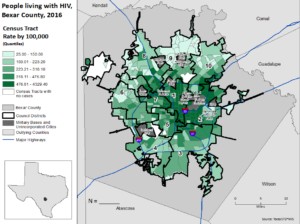Camille Morales, a public health aide, sits in the back of McCreless Library on a Thursday afternoon encouraging people to get tested for STDs. Morales has worked with the City of San Antonio’s Metropolitan Health District for three years and has helped treat hundreds of clients each year.
Morales’ visit to the library is part of the city’s initiative to send representatives out into the public where needs are highest.
According to the Centers for Disease Control, 2017 reported the highest number of sexually transmitted disease (STD) cases ever reported in the United States. Metro Health also reported Bexar County ranked third in the number of cases in the state of Texas with over 17,000 in that same year.
“For syphilis three years ago, we were at an outbreak and we’re at it again. We did do the treatment and controlled it, but now it’s at another outbreak,” Morales said.

Metro Health offers STD screenings Monday through Friday for $15 at its STD/HIV Clinic at 512 E. Highland. In addition to that location, they established their mobile clinic unit in 2013 primarily serving those who are prone to these diseases or have trouble getting services they need.
STDs have been a problem, both locally and nationally, for quite some time now. The center reported a spike in 2017 and county health officials say they are unsure whether this is due to a rise in actual cases or an increase in testing that comes out positive.
Health systems and medical providers across the country implemented STD/HIV mobile clinics as a preventative measure to help combat rising STD rates in vulnerable communities. These are usually small trucks or RVs that offer testing and treatment for most, if not all, STDs.
Reporting in a 2018 issue of Behavioral and Psychosocial Research, co-authors write, “Mobile health interventions may help People Living with HIV (PLWH) improve engagement in care.”
Anita K. Kurian, assistant director of the San Antonio Metropolitan Health District, said mobile health clinic locations are “based on the high burden of the sexually transmitted infections and areas with known high prevalence of risky behaviors.”
The clinic is stationed at different parts of the city on certain days of the week. For example, currently the clinic is at the Pegasus nightclub on the Main Street Strip every other Friday to provide free testing and treatment. They offer instant HIV testing as well, where a prick of a finger gives results within one minute.
Unfortunately, the mobile truck is out of service at the moment. During the month of December, services will be provided inside the locations listed at https://www.sanantonio.gov/Health/News/Events. The truck is expected to be back out in the new year.
The idea of STD mobile clinics in San Antonio began with the rise in cases, as well as the need for affordable and accessible care in the community.
“There was a great need to provide a mobile clinic to increase accessibility. It was crucial that when the funds were identified, we purchased a mobile testing unit that was capable of serving as an extension of the clinic to address issues of cost, accessibility and the ability to meet the community where they truly are,” City of San Antonio Health Program Manager Sian Elmore said.
The STD/HIV mobile clinic is funded under the 1115 Medicaid Waiver project through Centers for Medicare and Medicaid services (CMS). The mobile clinics are fully equipped with standard phlebotomy supplies like:
- tourniquets
- Band-Aids
- prep pads
- cotton balls
- straight/butterfly needles
- tube holders
- red top tubes to collect blood
- urine cups for urine collection
During testing events, the mobile unit is also equipped with treatment that is administered by a Licensed Vocational Nurse (LVN). At each event, the mobile clinic has two phlebotomists for specimen collection, one receptionist for paperwork and one LVN for examinations and treatment. Metro Health also utilizes volunteers and interns to assist with recruitment.
San Antonio recently joined the Fast-Track Cities initiative in 2017. Along with over 80 other cities in the U.S, San Antonio aims to end HIV as a public health threat by 2030. This can be done by achieving three goals set by this initiative:
- 90 percent of people with HIV knowing their status
- 90 percent of people diagnosed with HIV on treatment
- 90 percent of people on HIV treatment having undetectable viral loads
This type of clinic is a more proactive approach and could be the solution in getting testing and treatment services administered easier, and reaching the Fast-Track goal.
In the article Rapid HIV Testing of Clients of a Mobile STD/HIV Clinic, various authors suggest that rapid HIV testing services may “enhance the effectiveness of mobile STD/HIV clinics.”
“Instead of waiting for them to come in and get tested, we’re going out there to them,” Morales said.
To get the word out about this service, Metro Health uses several social media platforms including Twitter, Facebook and most recently Snapchat to promote the mobile unit’s activities and events.
Facebook and Twitter are mainly used to give information and locations of where the clinic will be, and Snapchat allows them to post photos and videos of events they put on.
The program hosts several community events throughout the year to provide education, testing, and treatment of STDs on the mobile unit. A monthly calendar of events to include the location of the mobile unit is also posted on Metro Health’s website.
Through this service, Metro Health has provided education and testing services all over San Antonio. It has allowed the team to be more visible in the community, which has broadened the reach of awareness about sexual health.
In years past, Texas A&M University-San Antonio offered health services through a mobile health clinic. It would serve the campus on specific days. However, this service was suddenly stopped with no explanation to students or staff.
San Antonio is home to two public universities. UTSA has a Student Health Services office that is located in their Recreation and Wellness Center. The office offers general health services, as well as STD services like condom stations, an anonymous STD question service and free HIV testing each month, courtesy of the San Antonio AIDS Foundation.
On the other hand, A&M-SA has no dedicated health center for students on campus at the moment. Students must outsource their care for any type of medical assistance they need.
According to the university website, “A&M-San Antonio does not currently offer Student Health Services and is in the process of evaluating healthcare needs on campus.”
Some A&M-SA students think an STD mobile clinic and its resources are needed on campus.
“I think it would be very beneficial because not that many people have transportation to go to an actual location, or they can’t afford it,” Business freshman Jasmin Don Juan said.
Others say the university should not have STD services on campus for various reasons.
“I think that students are already an adult when they come to this university and they should take responsibility for the actions that they take,” Kinesiology freshman Javier Contreras said.
“It’s probably gonna add to the tuition, so I would say make it cheaper. Don’t have to have all the fancy buildings, it’s too much,” Accounting junior Omar Arreola said.
For more information on the Metro Health STD mobile clinic and other services they provide, visit their website: https://www.sanantonio.gov/Health/HealthServices/STDServices





